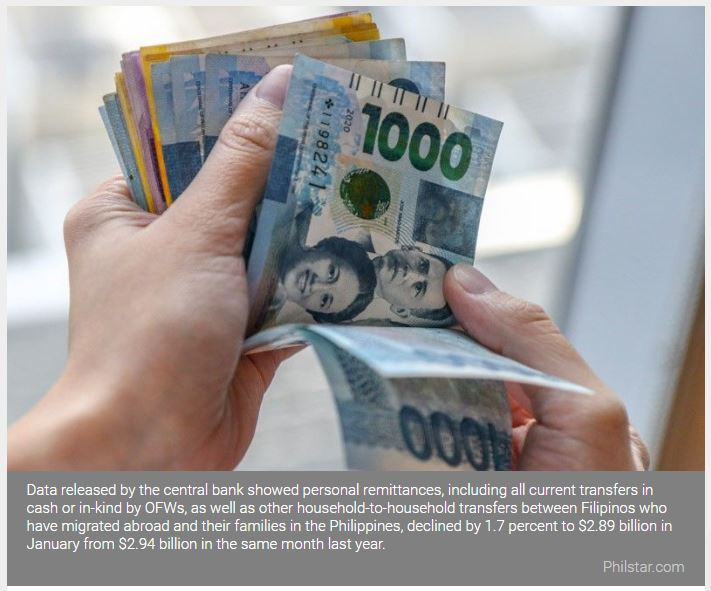Philippines: OFW remittances decline 1.7% to $2.89 billion in January
MANILA, Philippines — Remittances contracted for the second straight month in January, declining by 1.7 percent as more overseas Filipino workers (OFWs) are still being displaced worldwide, a year after the COVID-19 outbreak was declared a global pandemic, according to the Bangko Sentral ng Pilipinas (BSP).
Data released by the central bank showed personal remittances, including all current transfers in cash or in-kind by OFWs, as well as other household-to-household transfers between Filipinos who have migrated abroad and their families in the Philippines, declined by 1.7 percent to $2.89 billion in January from $2.94 billion in the same month last year.
The BSP attributed the marginal decline in personal remittances to the 2.4 percent drop in remittances from land-based OFWs to $2.22 billion in January from $2.27 billion a year ago, offsetting the one percent rise in the remittances from land and sea-based OFWs to $609 million in January from last year’s $603 million.
Likewise, the BSP reported a slight 1.7 percent decrease in cash remittances coursed through banks to $2.6 billion in January from $2.65 billion a year ago.
Cash remittances from land-based workers contracted by 2.4 percent to $2.04 billion, while the amount from sea-based workers inched up by one percent to $558 million during the review period.
The US emerged as the major source of remittances, with a share of 40.9 percent in January, followed by Singapore, Saudi Arabia, Japan, the United Kingdom, Canada, United Arab Emirates, Qatar, Malaysia and Taiwan.
Security Bank chief economist Robert Dan Roces said the contraction in remittances reflect the displacement of OFWs worldwide more than a year after the World Health Organization (WHO) declared the COVID-19 as a pandemic.
“But more than the seasonality, the year-on-year contraction also underscores unemployment among OFWs at the beginning of the year,” Roces said.
The Department of Labor and Employment (DOLE) estimated tha around 520,000 OFWs have been displaced by the pandemic.
The labor department said more than 410,000 OFWs have been repatriated since last year and around 60,000 to 80,000 more are expected to be brought back to the Philippines this year.
Personal and cash remittances slipped by 0.8 percent last year, better than the projected contraction of two percent.
Personal remittances reached $33.19 billion in 2020, $273 million lower than the all-time high of $33.47 billion in 2019, while cash remittances amounted to $29.9 billion, $230 million lower than the record high $30.13 billion last year.
For this year, the BSP sees remittances bouncing back with a growth of four percent. Remittances, accounting for more than nine percent of the country’s gross domestic product (GDP) last year, also serve as a major source of foreign exchange.
Roces said Security Bank is expecting a faster recovery for OFW remittances with a growth of six to seven percent for this year.
“For the year, we expect a rebound in OFW remittances on the back of more economies reopening this year, likely by as much as six to seven percent,” Roces said.
The peso emerged as one of the best performing currencies in the region, gaining more than five percent to close 2020 at a four-year high of 48.023 to $1 from 50.635 to $1 in end- 2019 due to weak demand for the greenback as global trade slumped due to the pandemic.
The local currency has lost 43.2 centavos since the start of the year after closing at 48.455 to $1 last Friday.
A weak peso benefits the families of Filipino workers abroad and increases the competitiveness of exporters as they get more value for their dollars but hurts importers who have to shell out more pesos for their imports.
Source: https://www.philstar.com/business/2021/03/16/2084509/ofw-remittances-decline-17-289-billion-january


 English
English




